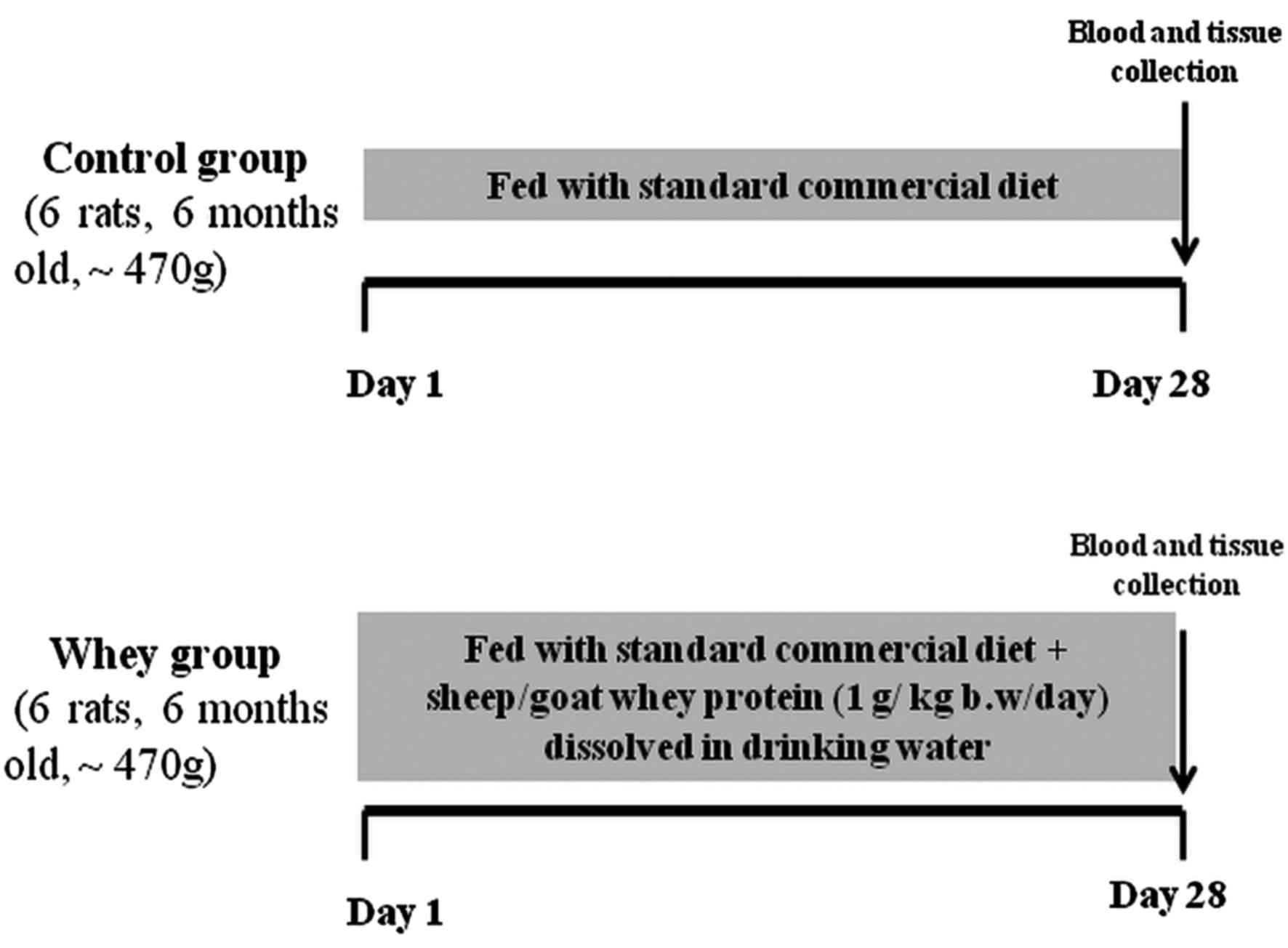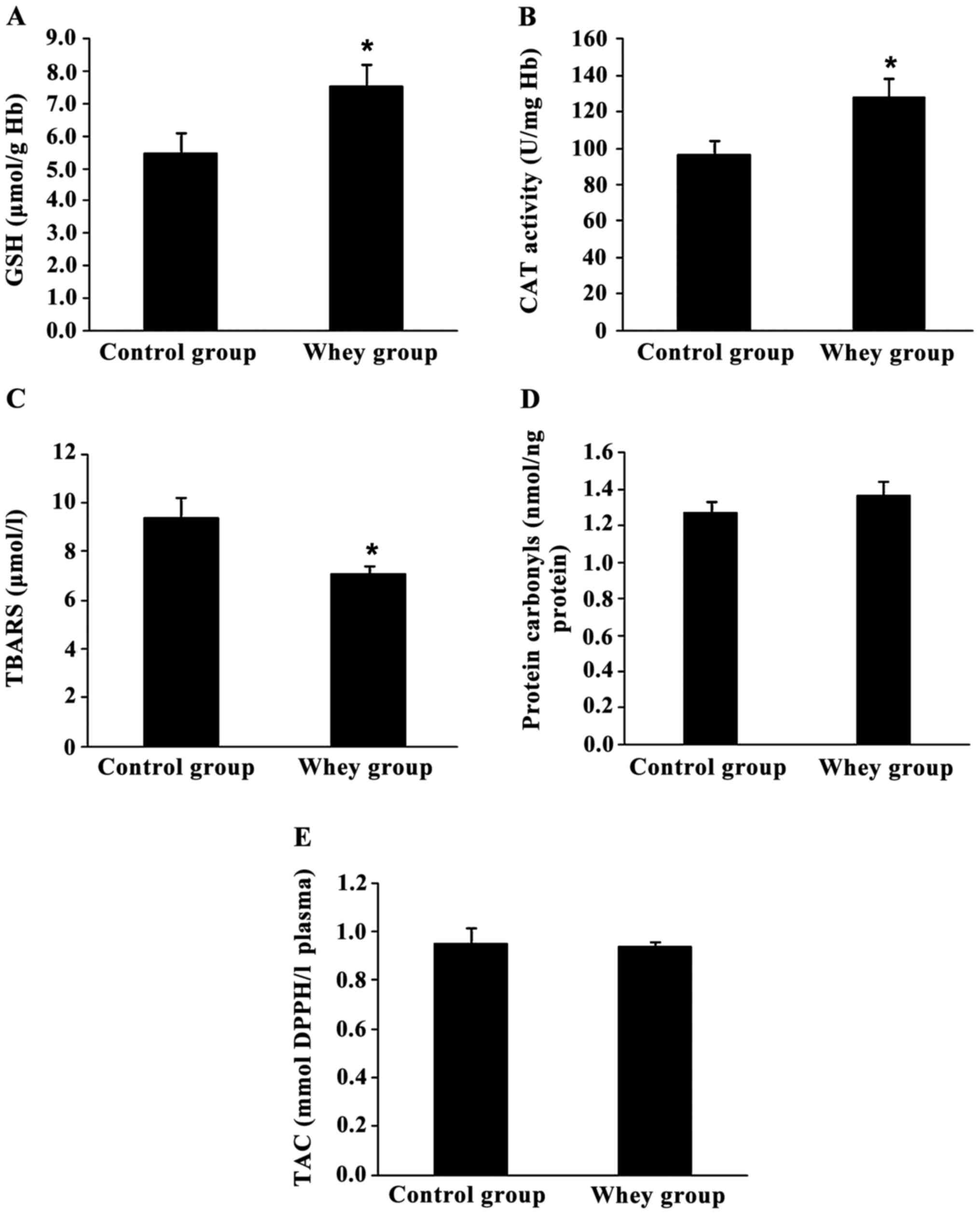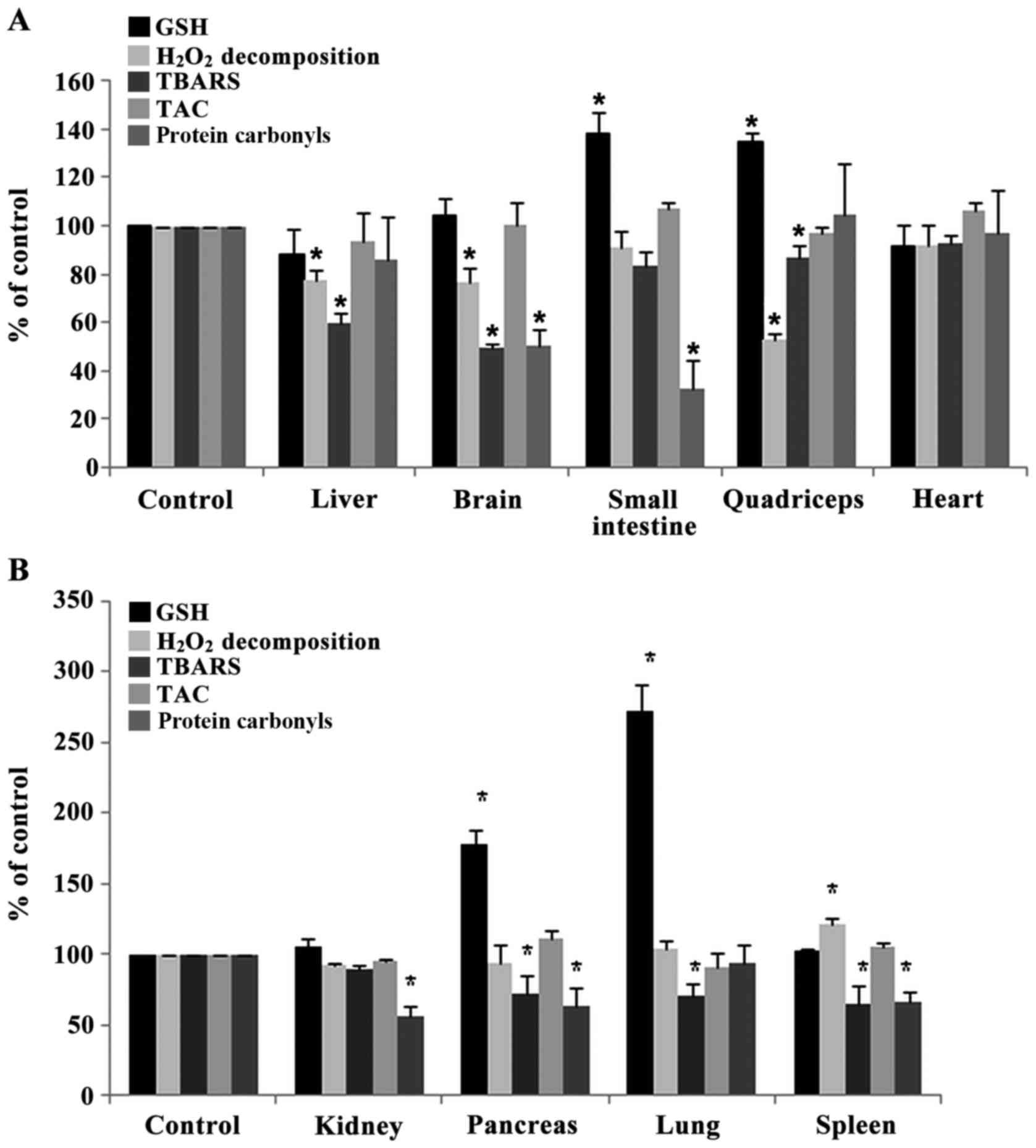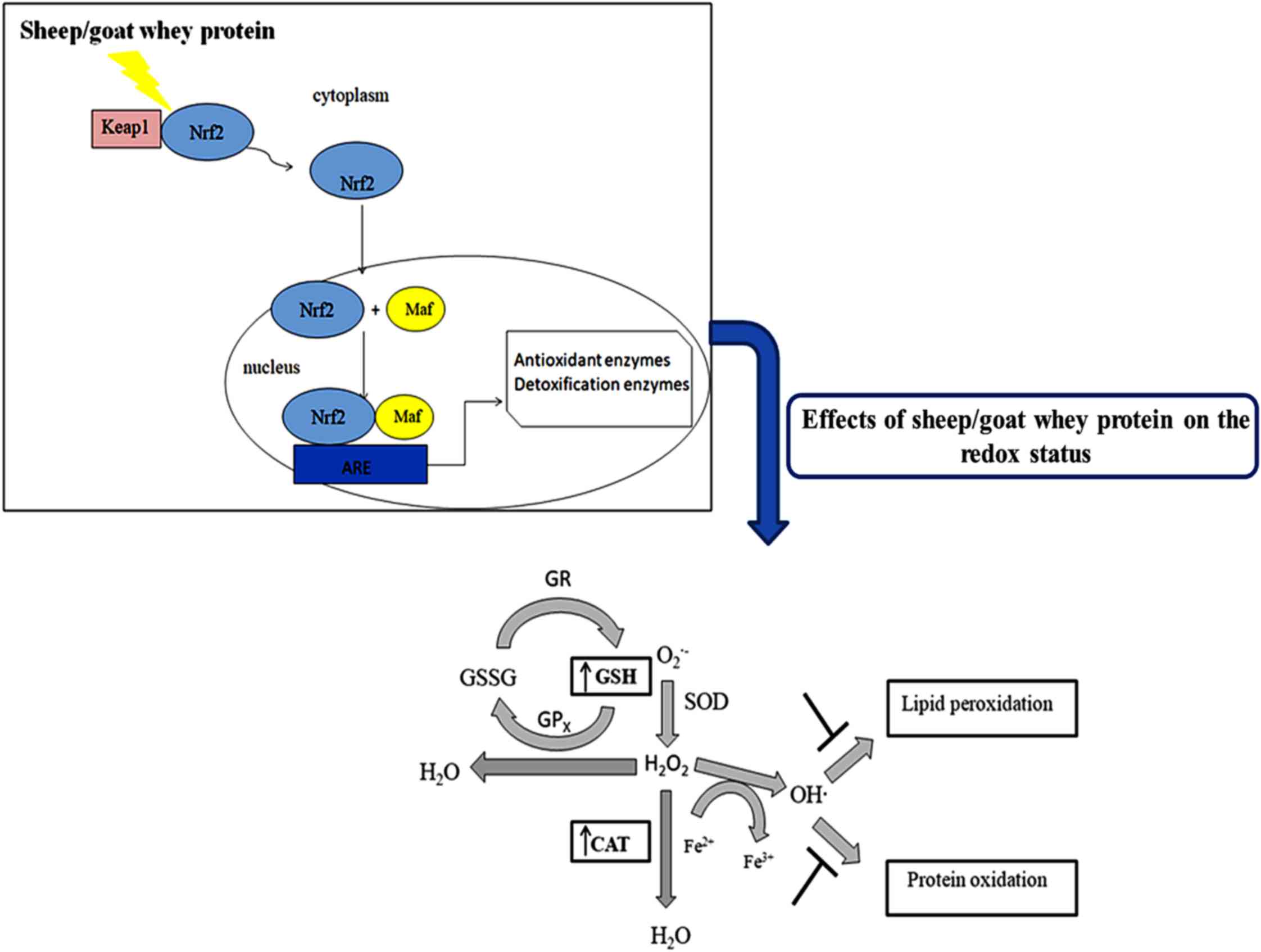|
1
|
Gill HS, Rutherfurd-Markwick KJ and Cross
ML: Bovine milk: A unique source of immunomodulatory ingredients
for functional foods. Functional Foods II - Claims and Evidence.
Saltmarsh M and Buttriss J: Royal Society of Chemistry Press. 248.
Cambridge: pp. 82–90. 2000
|
|
2
|
Walzem RL, Dillard CJ and German JB: Whey
components: Millennia of evolution create functionalities for
mammalian nutrition: What we know and what we may be overlooking.
Crit Rev Food Sci Nutr. 42:353–375. 2002. View Article : Google Scholar : PubMed/NCBI
|
|
3
|
Smithers GW: Whey and whey proteins - from
‘gutter-to-gold’. Int Dairy J. 18:695–704. 2008. View Article : Google Scholar
|
|
4
|
Farrell HM Jr, Jimenez-Flores R, Bleck GT,
Brown EM, Butler JE, Creamer LK, Hicks CL, Hollar CM, Ng-Kwai-Hang
KF and Swaisgood HE: Nomenclature of the proteins of cows' milk -
sixth revision. J Dairy Sci. 87:1641–1674. 2004. View Article : Google Scholar : PubMed/NCBI
|
|
5
|
Mollea C, Marmo L and Bosco F:
Valorisation of cheese whey, a by-product from the dairy industry.
Food Industry. Muzzalupo I: InTech549–588. 2013.
|
|
6
|
Marshall K: Therapeutic applications of
whey protein. Altern Med Rev. 9:136–156. 2004.PubMed/NCBI
|
|
7
|
Kerasioti E, Stagos D, Priftis A,
Aivazidis S, Tsatsakis AM, Hayes AW and Kouretas D: Antioxidant
effects of whey protein on muscle C2C12 cells. Food Chem.
155:271–278. 2014. View Article : Google Scholar : PubMed/NCBI
|
|
8
|
Kerasioti E, Stagos D, Georgatzi V, Bregou
E, Priftis A, Kafantaris I and Kouretas D: Antioxidant effects of
sheep whey protein on endothelial cells. Oxid Med Cell Lonqev 2016.
65857372016.
|
|
9
|
Kerasioti E, Stagos D, Tzimi A and
Kouretas D: Increase in antioxidant activity by sheep/goat whey
protein through nuclear factor-like 2 (Nrf2) is cell type
dependent. Food Chem Toxicol. 97:47–56. 2016b. View Article : Google Scholar
|
|
10
|
Kerasioti E, Kiskini A, Veskoukis A,
Jamurtas A, Tsitsimpikou C, Tsatsakis AM, Koutedakis Y, Stagos D,
Kouretas D and Karathanos V: Effect of a special
carbohydrate-protein cake on oxidative stress markers after
exhaustive cycling in humans. Food Chem Toxicol. 50:2805–2810.
2012. View Article : Google Scholar : PubMed/NCBI
|
|
11
|
Kerasioti E, Stagos D, Jamurtas A, Kiskini
A, Koutedakis Y, Goutzourelas N, Pournaras S, Tsatsakis AM and
Kouretas D: Anti-inflammatory effects of a special
carbohydrate-whey protein cake after exhaustive cycling in humans.
Food Chem Toxicol. 61:42–46. 2013. View Article : Google Scholar : PubMed/NCBI
|
|
12
|
Reddy YN, Murthy SV, Krishna DR and
Prabhakar MC: Role of free radicals and antioxidants in
tuberculosis patients. Indian J Tuberc. 51:213–218. 2004.
|
|
13
|
Spanidis Y, Mpesios A, Stagos D,
Goutzourelas N, Bar-Or D, Karapetsa M, Zakynthinos E, Spandidos DA,
Tsatsakis AM, Leon G and Kouretas D: Assessment of the redox status
in patients with metabolic syndrome and type 2 diabetes reveals
great variations. Exp Ther Med. 11:895–903. 2016. View Article : Google Scholar : PubMed/NCBI
|
|
14
|
Aebi H: Catalase in vitro. Methods
Enzymol. 105:121–126. 1984. View Article : Google Scholar : PubMed/NCBI
|
|
15
|
Janaszewska A and Bartosz G: Assay of
total antioxidant capacity: Comparison of four methods as applied
to human blood plasma. Scand J Clin Lab Invest. 62:231–236. 2002.
View Article : Google Scholar : PubMed/NCBI
|
|
16
|
Keles MS, Taysi S, Sen N, Aksoy H and
Akçay F: Effect of corticosteroid therapy on serum and CSF
malondialdehyde and antioxidant proteins in multiple sclerosis. Can
J Neurol Sci. 28:141–143. 2001. View Article : Google Scholar : PubMed/NCBI
|
|
17
|
Patsoukis N, Zervoudakis G, Panagopoulos
NT, Georgiou CD, Angelatou F and Matsokis NA: Thiol redox state
(TRS) and oxidative stress in the mouse hippocampus after
pentylenetetrazol-induced epileptic seizure. Neurosci Lett.
357:83–86. 2004. View Article : Google Scholar : PubMed/NCBI
|
|
18
|
Goutzourelas N, Stagos D, Demertzis N,
Mavridou P, Karterolioti H, Georgadakis S, Kerasioti E, Aligiannis
N, Skaltsounis L, Statiri A, et al: Effects of polyphenolic grape
extract on the oxidative status of muscle and endothelial cells.
Hum Exp Toxicol. 33:1099–1112. 2014. View Article : Google Scholar : PubMed/NCBI
|
|
19
|
Goutzourelas N, Stagos D, Housmekeridou A,
Karapouliou C, Kerasioti E, Aligiannis N, Skaltsounis AL, Spandidos
DA, Tsatsakis AM and Kouretas D: Grape pomace extract exerts
antioxidant effects through an increase in GCS levels and GST
activity in muscle and endothelial cells. Int J Mol Med.
36:433–441. 2015. View Article : Google Scholar : PubMed/NCBI
|
|
20
|
Priftis A, Stagos D, Konstantinopoulos K,
Tsitsimpikou C, Spandidos DA, Tsatsakis AM, Tzatzarakis MN and
Kouretas D: Comparison of antioxidant activity between green and
roasted coffee beans using molecular methods. Mol Med Rep.
12:7293–7302. 2015. View Article : Google Scholar : PubMed/NCBI
|
|
21
|
Kouka P, Priftis A, Stagos D, Angelis A,
Stathopoulos P, Xinos N, Skaltsounis AL, Mamoulakis C, Tsatsakis
AM, Spandidos DA and Kouretas D: Assessment of the antioxidant
activity of an olive oil total polyphenolic fraction and
hydroxytyrosol from a Greek Olea europea variety in endothelial
cells and myoblasts. Int J Mol Med. 40:703–712. 2017. View Article : Google Scholar : PubMed/NCBI
|
|
22
|
Makri S, Kafantaris I, Stagos D,
Chamokeridou T, Petrotos K, Gerasopoulos K, Mpesios A, Goutzourelas
N, Kokkas S, Goulas P, et al: Novel feed including bioactive
compounds from winery wastes improved broilers' redox status in
blood and tissues of vital organs. Food Chem Toxicol. 102:24–31.
2017. View Article : Google Scholar : PubMed/NCBI
|
|
23
|
Li YR: Free Radical Biomedicine:
Principles, Clinical Correlations, and Methodologies. Bentham
Science Publishers; Blacksburg, VA: 2012, View Article : Google Scholar
|
|
24
|
Sahiner UM, Birben E, Erzurum S, Sackesen
C and Kalayci O: Oxidative stress in asthma. World Allergy Organ J.
4:151–158. 2011. View Article : Google Scholar : PubMed/NCBI
|
|
25
|
Nikitovic D, Corsini E, Kouretas D,
Tsatsakis A and Tzanakakis G: ROS-major mediators of extracellular
matrix remodeling during tumor progression. Food Chem Toxicol.
61:178–186. 2013. View Article : Google Scholar : PubMed/NCBI
|
|
26
|
Jenner P: Oxidative stress in Parkinson's
disease. Ann Neurol. 53 Suppl 3:S26–S36, discussion S36-S38. 2003.
View Article : Google Scholar : PubMed/NCBI
|
|
27
|
Honda K, Casadesus G, Petersen RB, Perry G
and Smith MA: Oxidative stress and redox-active iron in Alzheimer's
disease. Ann N Y Acad Sci. 1012:179–182. 2004. View Article : Google Scholar : PubMed/NCBI
|
|
28
|
Dut R, Dizdar EA, Birben E, Sackesen C,
Soyer OU, Besler T and Kalayci O: Oxidative stress and its
determinants in the airways of children with asthma. Allergy.
63:1605–1609. 2008. View Article : Google Scholar : PubMed/NCBI
|
|
29
|
Uchida K: Role of reactive aldehyde in
cardiovascular diseases. Free Radic Biol Med. 28:1685–1696. 2000.
View Article : Google Scholar : PubMed/NCBI
|
|
30
|
Shoveller AK, Stoll B, Ball RO and Burrin
DG: Nutritional and functional importance of intestinal sulfur
amino acid metabolism. J Nutr. 135:1609–1612. 2005. View Article : Google Scholar : PubMed/NCBI
|
|
31
|
Lu SC: Regulation of glutathione
synthesis. Mol Aspects Med. 30:42–59. 2009. View Article : Google Scholar : PubMed/NCBI
|
|
32
|
Weydert CJ and Cullen JJ: Measurement of
superoxide dismutase, catalase and glutathione peroxidase in
cultured cells and tissue. Nat Protoc. 5:51–66. 2010. View Article : Google Scholar : PubMed/NCBI
|
|
33
|
Kim J, Paik HD, Yoon YC and Park E: Whey
protein inhibits iron overload-induced oxidative stress in rats. J
Nutr Sci Vitaminol (Tokyo). 59:198–205. 2013. View Article : Google Scholar : PubMed/NCBI
|
|
34
|
Haraguchi FK, Silva ME, Neves LX, dos
Santos RC and Pedrosa ML: Whey protein precludes lipid and protein
oxidation and improves body weight gain in resistance-exercised
rats. Eur J Nutr. 50:331–339. 2011. View Article : Google Scholar : PubMed/NCBI
|
|
35
|
Kelly VP, Ellis EM, Manson MM, Chanas SA,
Moffat GJ, McLeod R, Judah DJ, Neal GE and Hayes JD:
Chemoprevention of aflatoxin B1 hepatocarcinogenesis by coumarin, a
natural benzopyrone that is a potent inducer of aflatoxin
B1-aldehyde reductase, the glutathione S-transferase A5 and P1
subunits, and NAD(P)H:quinone oxidoreductase in rat liver. Cancer
Res. 60:957–969. 2000.PubMed/NCBI
|
|
36
|
Li J, Lee JM and Johnson JA: Microarray
analysis reveals an antioxidant responsive element-driven gene set
involved in conferring protection from an oxidative stress-induced
apoptosis in IMR-32 cells. J Biol Chem. 277:388–394. 2002.
View Article : Google Scholar : PubMed/NCBI
|
|
37
|
Talalay P, Dinkova-Kostova AT and
Holtzclaw WD: Importance of phase 2 gene regulation in protection
against electrophile and reactive oxygen toxicity and
carcinogenesis. Adv Enzyme Regul. 43:121–134. 2003. View Article : Google Scholar : PubMed/NCBI
|
|
38
|
Kwak MK, Wakabayashi N, Itoh K, Motohashi
H, Yamamoto M and Kensler TW: Modulation of gene expression by
cancer chemopreventive dithiolethiones through the Keap1-Nrf2
pathway. Identification of novel gene clusters for cell survival. J
Biol Chem. 278:8135–8145. 2003. View Article : Google Scholar : PubMed/NCBI
|
|
39
|
Tsuji-Naito K and Jack RW: Concentrated
bovine milk whey active proteins facilitate osteogenesis through
activation of the JNK-ATF4 pathway. Biosci Biotechnol Biochem.
76:1150–1154. 2012. View Article : Google Scholar : PubMed/NCBI
|
|
40
|
Scott MD, Lubin BH, Zuo L and Kuypers FA:
Erythrocyte defense against hydrogen peroxide: Preeminent
importance of catalase. J Lab Clin Med. 118:7–16. 1991.PubMed/NCBI
|
|
41
|
Halliwell B, Clement MV and Long LH:
Hydrogen peroxide in the human body. FEBS Lett. 486:10–13. 2000.
View Article : Google Scholar : PubMed/NCBI
|
|
42
|
Tabet F and Touyz RM: Reactive oxygen
species, oxidative stress, and vascular biology in hypertension.
Comprehensive Hypertension. Elsevier; pp. 337–347. 2007, View Article : Google Scholar
|
|
43
|
Ayala A, Muñoz MF and Argüelles S: Lipid
peroxidation: Production, metabolism, and signaling mechanisms of
malondialdehyde and 4-hydroxy-2-nonenal. Oxid Med Cell Longev.
2014:3604382014. View Article : Google Scholar : PubMed/NCBI
|
|
44
|
Sherratt PJ and Hayes JD: Glutathione
S-transferases. Enzyme Systems that Metabolise Drugs and Other
Xenobiotics. Ioannides C: John Wiley & Sons Ltd.; Hoboken, NJ:
pp. 319–352. 2002, View Article : Google Scholar
|
|
45
|
Grune T, Reinheckel T and Davies KJA:
Degradation of oxidized proteins in mammalian cells. FASEB J.
11:526–534. 1997. View Article : Google Scholar : PubMed/NCBI
|
|
46
|
Halliwell B and Gutteridge JMC: Chapter 2.
In: Free radicals in biology and medicine. 3rd. Oxford Science
Publications; 1999
|
|
47
|
Renke J, Popadiuk S, Korzon M, Bugajczyk B
and Wozniak M: Protein carbonyl groups' content as a useful
clinical marker of antioxidant barrier impairment in plasma of
children with juvenile chronic arthritis. Free Radic Biol Med.
29:101–104. 2000. View Article : Google Scholar : PubMed/NCBI
|
|
48
|
Levine RL: Carbonyl modified proteins in
cellular regulation, aging, and disease. Free Radic Biol Med.
32:790–796. 2002. View Article : Google Scholar : PubMed/NCBI
|
|
49
|
Lipinski B: Hydroxyl radical and its
scavengers in health and disease. Oxid Med Cell Longev.
2011:8096962011. View Article : Google Scholar : PubMed/NCBI
|


















